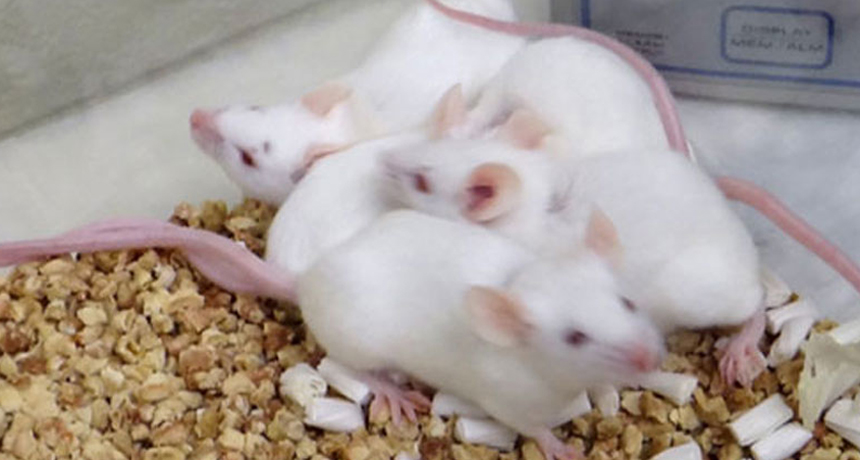Cancers like it cool
At least in mice, cancerous tumors grew more slowly when the body was comfortably warm

Are these mice cuddling to stay warm? Most lab animals live in rooms kept cooler than they find comfortable. If they also have cancer, cool room temperatures can boost their tumors’ growth and spread, new data show.
Courtesy of Kathleen Kokolus and Sandra Sexton
By Janet Raloff
Research labs usually house their mice at temperatures between 20° and 26° Celsius (that’s 68° to 79° Fahrenheit). Mice find this a tad cool. To cope, their bodies will generate a little extra internal heat. Now scientists find a troubling down side to keeping the thermostat low: It boosts cancer growth.
Elizabeth Repasky and her colleagues at the Roswell Park Cancer Institute in Buffalo, N.Y., raised animals at about 22.5 °C (72.5 °F). They kept others in a room that was roughly 30.5 °C (87 °F). Animals in the warmer room developed fewer tumors. Their cancers also grew more slowly and were less likely to seed new tumors throughout the body. Such cancer spread, called metastasis, can greatly reduce how effective any treatment will be.
The researchers suspect that chilly room temperatures mess with immunity. The immune system normally helps fight disease by unleashing protective white blood cells that will kill harmful cells and germs or that will remove poisons. Mice kept at the lower temperature had fewer killer T cells, a type of white blood cell, in and around their tumors. Cells known to partially turn off immunity also were present in higher numbers near those tumors.
“Our study shows that enduring even mild cold stress blocks strong immunity against cancer,” concludes Repasky, who led the new study. Her team reported its findings November 18 in the Proceedings of the National Academy of Sciences.
There was no difference in body temperature between mice housed in warm or cool rooms. This suggests that chilly mice generate extra heat — something known as thermogenesis — to help cope with the cool room air. And it’s possible, the scientists say, that if the mice hadn’t needed to supply this bonus warming, they would have had more energy available to fight the tumors.
Almost all cancer studies that use mice raise those animals at cool temperatures. These studies are meant to provide clues to cancer risks and treatment responses in people. But those studies might provide flawed answers about cancer risk if temperature has been exaggerating the animals’ responses, the new study warns. Findings from mice living in chilly rooms could mean that a new treatment being tested against cancer might appear to work better — or worse — than if the animals hadn’t felt cool, Repasky says. “We are testing these possibilities at the present time.”
Her group’s findings also raise interesting questions about the importance of keeping cancer patients comfortably warm. For people treated with certain drugs that work through the immune system, such warmth may prove especially important, her team says. Indeed, some of these drugs cause cancer patients to experience “deep chills.”
Power Words
cancer The rapid, uncontrolled growth of abnormal cells. It can lead to tumors, pain and death.
immune system The collection of cells and their responses that help the body fight off infection.
immunity The ability of an organism to resist a particular infection or poison by producing and releasing special protective cells.
metastasis (in medicine) The spread of cancer cells from a primary tumor to sites throughout the body. Once this occurs, finding and treating the cancer becomes especially difficult, if not impossible.
thermogenesis (in biology) The body’s production of heat, usually fueled by food.
tumor A mass of cells characterized by atypical and often uncontrolled growth. Benign tumors will not spread; they just grow and cause problems if they press against or tighten around healthy tissue. Malignant tumors will ultimately shed cells that can seed the body with new tumors. Malignant tumors are also known as cancers.
white blood cells A family of cells that help fight germs and disease. There are many types and they are major players in the body’s immune system.







